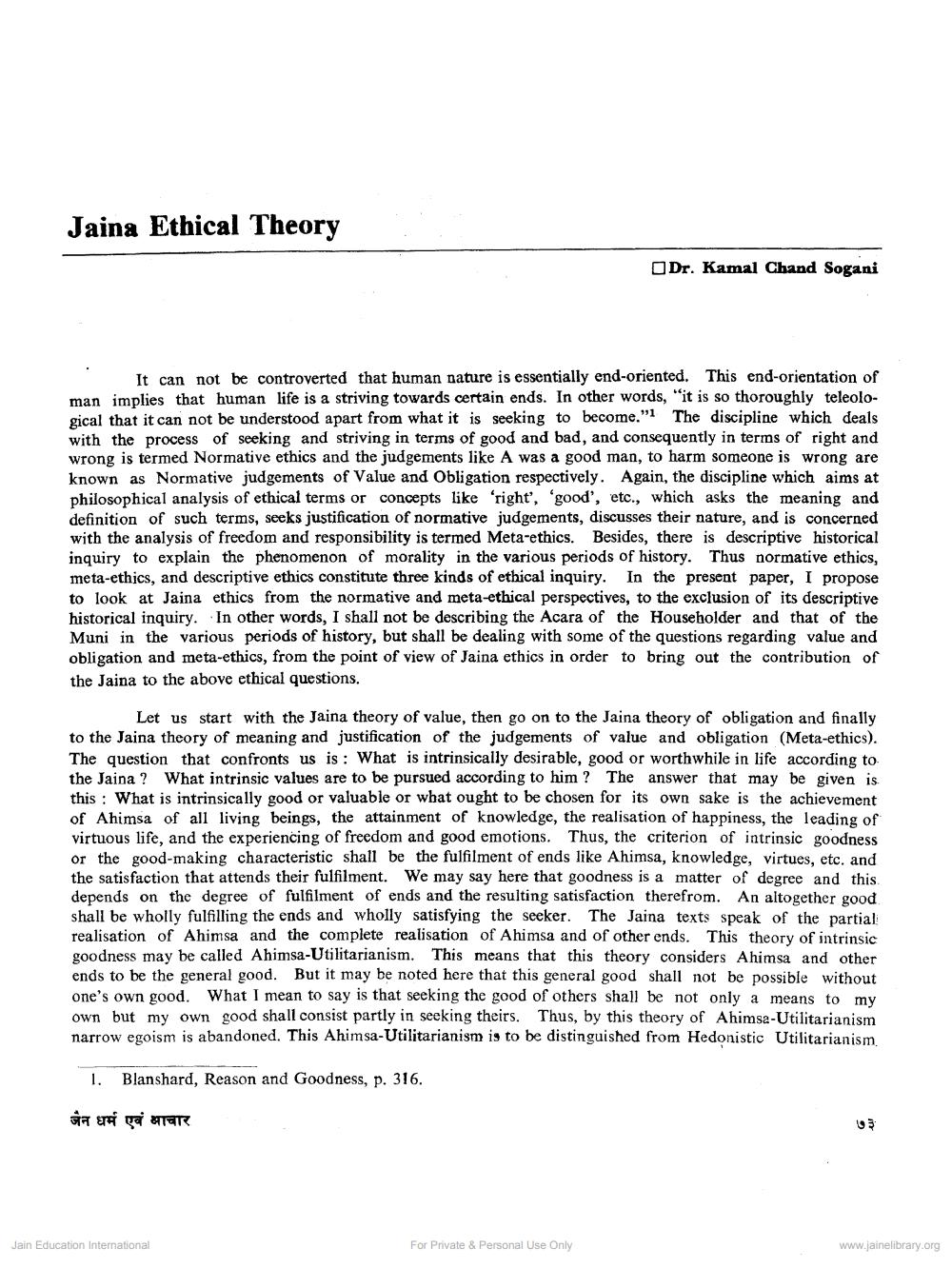Book Title: Jaina Ethical Theory Author(s): Kamalchand Sogani Publisher: Z_Deshbhushanji_Maharaj_Abhinandan_Granth_012045.pdf View full book textPage 1
________________ Jaina Ethical Theory It can not be controverted that human nature is essentially end-oriented. This end-orientation of man implies that human life is a striving towards certain ends. In other words, "it is so thoroughly teleological that it can not be understood apart from what it is seeking to become." The discipline which deals with the process of seeking and striving in terms of good and bad, and consequently in terms of right and wrong is termed Normative ethics and the judgements like A was a good man, to harm someone is wrong are known as Normative judgements of Value and Obligation respectively. Again, the discipline which aims at philosophical analysis of ethical terms or concepts like 'right', 'good', etc., which asks the meaning and definition of such terms, seeks justification of normative judgements, discusses their nature, and is concerned with the analysis of freedom and responsibility is termed Meta-ethics. Besides, there is descriptive historical inquiry to explain the phenomenon of morality in the various periods of history. Thus normative ethics, meta-ethics, and descriptive ethics constitute three kinds of ethical inquiry. In the present paper, I propose to look at Jaina ethics from the normative and meta-ethical perspectives, to the exclusion of its descriptive historical inquiry. In other words, I shall not be describing the Acara of the Householder and that of the Muni in the various periods of history, but shall be dealing with some of the questions regarding value and obligation and meta-ethics, from the point of view of Jaina ethics in order to bring out the contribution of the Jaina to the above ethical questions. Dr. Kamal Chand Sogani Let us start with the Jaina theory of value, then go on to the Jaina theory of obligation and finally to the Jaina theory of meaning and justification of the judgements of value and obligation (Meta-ethics). The question that confronts us is: What is intrinsically desirable, good or worthwhile in life according to the Jaina? What intrinsic values are to be pursued according to him? The answer that may be given is this: What is intrinsically good or valuable or what ought to be chosen for its own sake is the achievement of Ahimsa of all living beings, the attainment of knowledge, the realisation of happiness, the leading of virtuous life, and the experiencing of freedom and good emotions. Thus, the criterion of intrinsic goodness or the good-making characteristic shall be the fulfilment of ends like Ahimsa, knowledge, virtues, etc. and the satisfaction that attends their fulfilment. We may say here that goodness is a matter of degree and this depends on the degree of fulfilment of ends and the resulting satisfaction therefrom. An altogether good shall be wholly fulfilling the ends and wholly satisfying the seeker. The Jaina texts speak of the partial realisation of Ahimsa and the complete realisation of Ahimsa and of other ends. This theory of intrinsic goodness may be called Ahimsa-Utilitarianism. This means that this theory considers Ahimsa and other ends to be the general good. But it may be noted here that this general good shall not be possible without one's own good. What I mean to say is that seeking the good of others shall be not only a means to my own but my own good shall consist partly in seeking theirs. Thus, by this theory of Ahimsa-Utilitarianism narrow egoism is abandoned. This Ahimsa-Utilitarianism is to be distinguished from Hedonistic Utilitarianism. 1. Blanshard, Reason and Goodness, p. 316. जैन धर्म एवं आचार Jain Education International For Private & Personal Use Only ७३ www.jainelibrary.orgPage Navigation
1 2 3 4 5 6 7 8 9 10 11 12
